In today's fast-paced digital environment, maintaining a consistent social media presence is non-negotiable for growth. Yet, the daily grind of crafting, scheduling, and publishing content across multiple platforms can consume hours you simply don't have. This is where the best social media scheduling tools come in. They aren't just about saving time; they are strategic assets that unlock consistent brand messaging, optimal posting times, and deeper audience engagement.
But with dozens of options available, how do you choose the one that fits your specific workflow and budget? This guide cuts through the noise. We have rigorously tested and analyzed the top platforms on the market, from industry giants like Hootsuite and Sprout Social to niche specialists like Later and PLANOLY. Our focus is on real-world use cases, unique features, and honest limitations.
Whether you're a solopreneur managing evergreen content, a small business scaling up, or an agency juggling multiple clients, you will find the perfect tool to streamline your workflow right here. For those specifically exploring cost-effective solutions to get started, our overview of free social media scheduling tools can be incredibly helpful.
This comprehensive list moves beyond marketing copy to provide in-depth analysis, direct links, and screenshots for each tool. We'll help you identify the right platform to reclaim your time and amplify your social media results, allowing you to focus on strategy instead of manual posting.
1. EvergreenFeed
EvergreenFeed carves out a unique and powerful niche among the best social media scheduling tools by focusing on one thing and doing it exceptionally well: automating the continuous sharing of your most valuable evergreen content. Instead of just scheduling posts, it acts as an intelligent recycling engine that works in tandem with Buffer. This synergy allows marketers and creators to maintain a consistently active and engaging social media presence with minimal hands-on effort, solving the common problem of content calendars running dry.
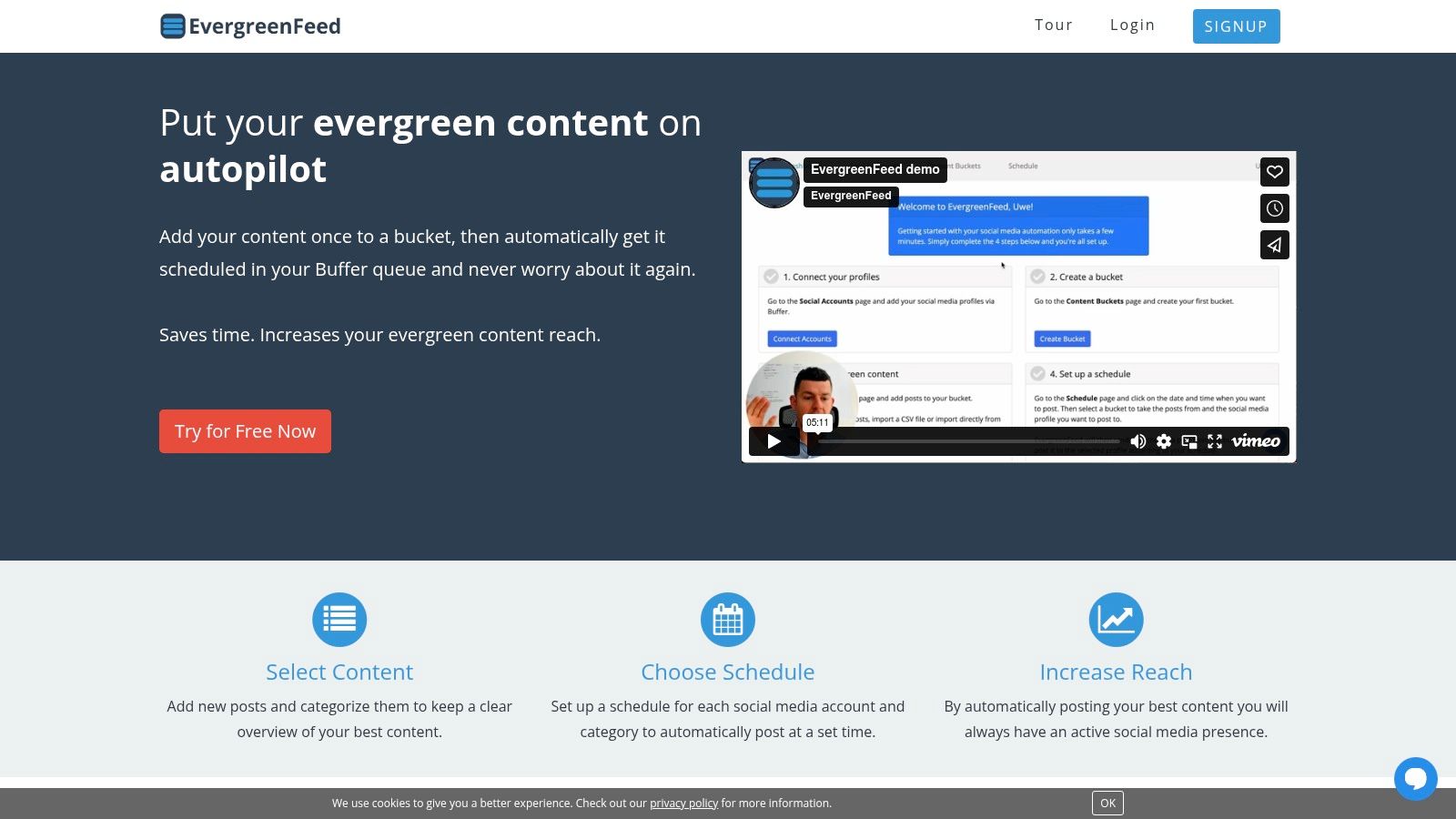
The platform’s strength lies in its "content buckets" system. You can categorize your timeless content, like blog posts, tips, quotes, or case studies, into separate buckets. From there, you set a custom schedule for each category on each social profile, and EvergreenFeed intelligently randomizes and publishes posts from these buckets, ensuring your feed remains fresh and varied. This set-it-and-forget-it approach is a game-changer for time-strapped teams.
Standout Features & Use Cases
EvergreenFeed's design is purpose-built for efficiency. Its core value proposition is saving you hours of manual scheduling each week, a claim supported by user testimonials reporting over 7 hours saved.
- Content Buckets: Organize posts by theme (e.g., "Tuesday Tips," "Blog Promotions," "Company Culture"). This ensures a balanced content mix without manual planning.
- Buffer Integration: It seamlessly connects with your existing Buffer account, leveraging Buffer's robust publishing capabilities while adding a layer of sophisticated automation.
- Intelligent Randomization: By randomizing posts within each bucket, the tool prevents your feed from becoming repetitive and predictable, which is crucial for maintaining audience engagement.
Real-World Application: A content creator can create a bucket for their top 50 blog posts. By setting EvergreenFeed to post one link from this bucket daily, they ensure their best content continuously reaches new followers without ever having to reschedule a single post manually.
Pricing and Access
EvergreenFeed is highly accessible, offering a free signup that does not require a credit card. This allows new users to explore its core functionality and experience the time-saving benefits firsthand. For users with more advanced needs, such as managing more accounts or requiring deeper analytics, there are paid tiers available.
- Pros:
- Saves significant time by automating repetitive scheduling tasks.
- Content categorization keeps social feeds organized and diverse.
- Centralizes control of multiple Buffer accounts.
- Cons:
- Exclusively integrates with Buffer, limiting its use for those on other platforms.
- Advanced features require upgrading from the free plan.
Website: https://www.evergreenfeed.com
2. Hootsuite
Hootsuite is a veteran in the social media management space, evolving from a simple scheduler into a comprehensive, full-stack platform. It’s particularly well-suited for larger teams and enterprises that require robust analytics, complex approval workflows, and deep social listening capabilities, making it one of the best social media scheduling tools for organizations focused on brand monitoring and competitive analysis.
The platform allows for unlimited post scheduling across all major networks, complete with AI-powered suggestions for optimal posting times. Its AI writer, OwlyWriter, can generate captions and content ideas, which is a significant time-saver for busy content teams. Hootsuite truly shines in its collaborative features, allowing managers to assign tasks, review posts, and manage permissions seamlessly.
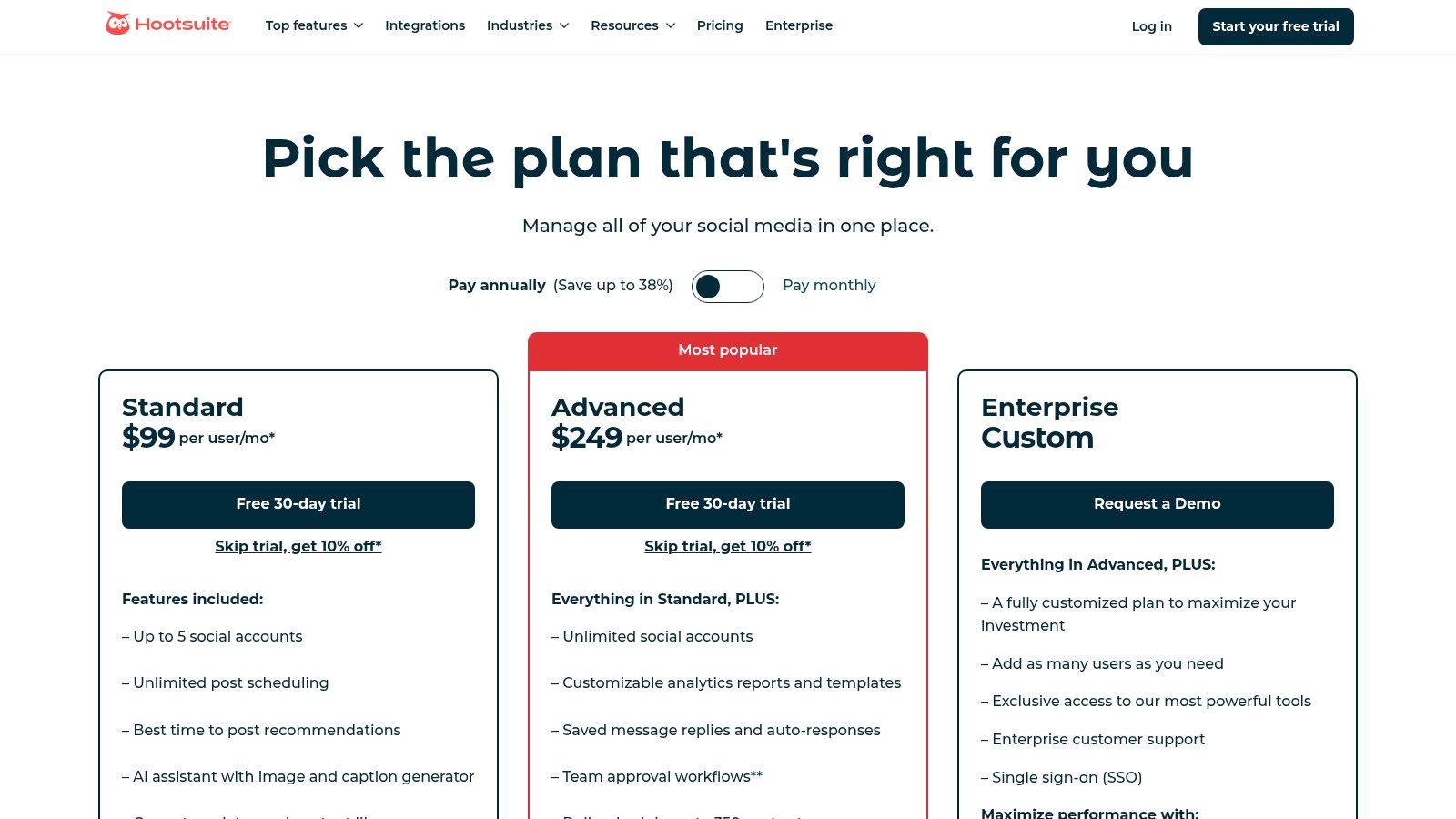
Key Features & Use Case
Hootsuite's unified inbox centralizes comments and direct messages from all connected profiles, enabling teams to respond efficiently and even set up automations for common queries. The platform’s analytics extend beyond basic metrics, offering competitive benchmarking and sentiment analysis to gauge public perception. This makes it ideal for marketing agencies managing multiple client accounts or for brands needing to track their market position closely.
- Best For: Enterprises, marketing agencies, and large teams needing advanced analytics and collaborative workflows.
- Standout Feature: Enterprise-grade approval systems and in-depth social listening add-ons.
- Pricing: Plans start with the Professional tier at $99 per month for 1 user and 10 social accounts. The Team plan is $249 per month, and custom pricing is available for Business and Enterprise tiers.
Pros & Cons
| Pros | Cons |
|---|---|
| Mature enterprise capabilities and approval workflows | Pricing can be higher than SMB-focused tools |
| Strong analytics, reporting, and social listening add-ons | Advanced listening features may require additional add-ons |
| Comprehensive platform with inbox, scheduling, and analytics | The user interface can feel complex for beginners |
Website: https://www.hootsuite.com/plans/business
3. Sprout Social
Sprout Social positions itself as a premium, all-in-one social media management solution, combining scheduling with robust CRM, analytics, and listening capabilities. It is designed for businesses and agencies that require a sophisticated tool for managing complex social strategies and proving ROI. As one of the best social media scheduling tools, it excels in providing detailed reporting and streamlined team collaboration, making it a favorite among data-driven marketing teams.
The platform offers a unified "Smart Inbox" that gathers messages from all connected networks, turning social media into a powerful customer care channel. Its publishing and scheduling tools are intuitive, featuring a visual calendar, optimal send time suggestions, and asset management libraries. Sprout’s AI Assist feature further enhances productivity by helping teams generate and refine copy, ensuring content remains on-brand and engaging.
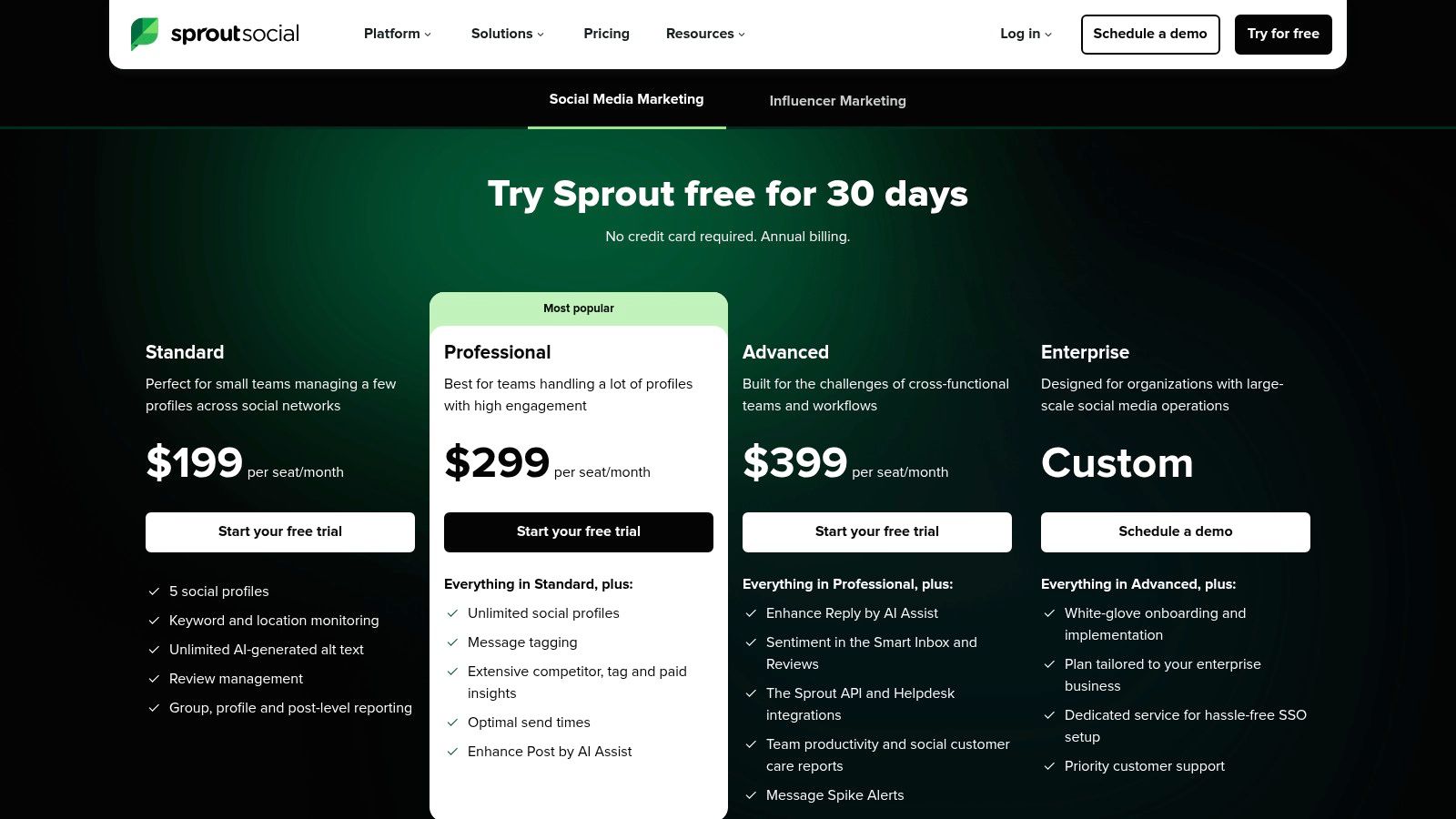
Key Features & Use Case
Sprout Social truly stands out with its advanced analytics and reporting suite. Users can generate highly detailed, presentation-ready reports on post performance, audience demographics, and competitive analysis. These insights are invaluable for agencies needing to demonstrate value to clients or for brands looking to tie social media efforts directly to business objectives. The platform’s workflow management tools, including message-level tasking and approval queues, are ideal for larger teams where multiple stakeholders are involved in content creation and response.
- Best For: Medium to large businesses and agencies that prioritize data-driven decisions and customer care.
- Standout Feature: Market-leading reporting capabilities and an integrated social CRM Smart Inbox.
- Pricing: The Standard plan starts at $249 per month per user. The Professional plan is $399 per user per month, with custom pricing for the Advanced and Enterprise tiers.
Pros & Cons
| Pros | Cons |
|---|---|
| Market-leading reporting and team workflow features | Per-seat pricing can become expensive for larger teams |
| Strong customer support and enterprise options | Some premium add-ons are priced separately from core plans |
| Powerful all-in-one platform with publishing, CRM, and analytics | The sheer number of features may be overwhelming for solo users |
Website: https://sproutsocial.com/pricing/?utm_source=openai
4. Buffer
Buffer is a long-standing favorite known for its clean, intuitive interface and straightforward approach to social media management. It’s designed primarily for creators, small businesses, and brands that need an efficient, no-fuss way to schedule content and engage with their audience. Its simplicity makes it one of the best social media scheduling tools for those who want to get started quickly without a steep learning curve.
The platform supports all major networks, including newer additions like TikTok and Threads, offering a streamlined content calendar and queue system. Buffer's per-channel pricing model provides excellent flexibility, allowing users to pay only for what they need. Key features like a hashtag manager, first-comment scheduling for Instagram, and integrations with Canva and Zapier make content creation and distribution seamless. You can learn more about how to schedule social media posts with tools like Buffer to optimize your workflow.
Key Features & Use Case
Buffer's strength lies in its core scheduling and engagement tools. The platform includes a unified inbox for managing comments and an analytics suite to track post performance, audience growth, and key metrics. The "best time to post" suggestions help optimize your content schedule for maximum reach. This makes Buffer an ideal solution for solo content creators or small marketing teams who prioritize efficient content publishing and community management over complex enterprise features.
- Best For: Small businesses, content creators, and marketing teams looking for a user-friendly and affordable scheduler.
- Standout Feature: Flexible and transparent per-channel pricing model, plus a generous free plan.
- Pricing: A Free plan is available. The Essentials plan starts at $6 per month per channel, and the Team plan starts at $12 per month per channel, with options for custom add-ons.
Pros & Cons
| Pros | Cons |
|---|---|
| Simple, clean, and extremely user-friendly interface | Team features and workflows require the more expensive Team plan |
| Excellent free tier for testing the workflow and basic needs | Enterprise-level controls are lighter compared to peers |
| Flexible and affordable per-channel pricing | Advanced analytics can feel basic for data-heavy teams |
Website: https://buffer.com/pricing
5. Later
Later began as an Instagram-first scheduling tool and has since evolved into a comprehensive platform that excels in visual content planning. It remains a top choice for brands, creators, and agencies whose marketing strategy is heavily reliant on Instagram, TikTok, and Pinterest. Its intuitive drag-and-drop visual planner allows users to see exactly how their feed will look, making it one of the best social media scheduling tools for maintaining a specific aesthetic.
The platform extends its visual-centric approach to other networks, but its core strength lies in its deep Instagram integration. Features like the Linkin.bio tool, which turns your social bio into a clickable landing page, and the ability to schedule Instagram Stories and Reels, are standout offerings. Higher-tier plans introduce an AI Caption Writer and more advanced analytics, providing a complete suite for visually driven social media management.
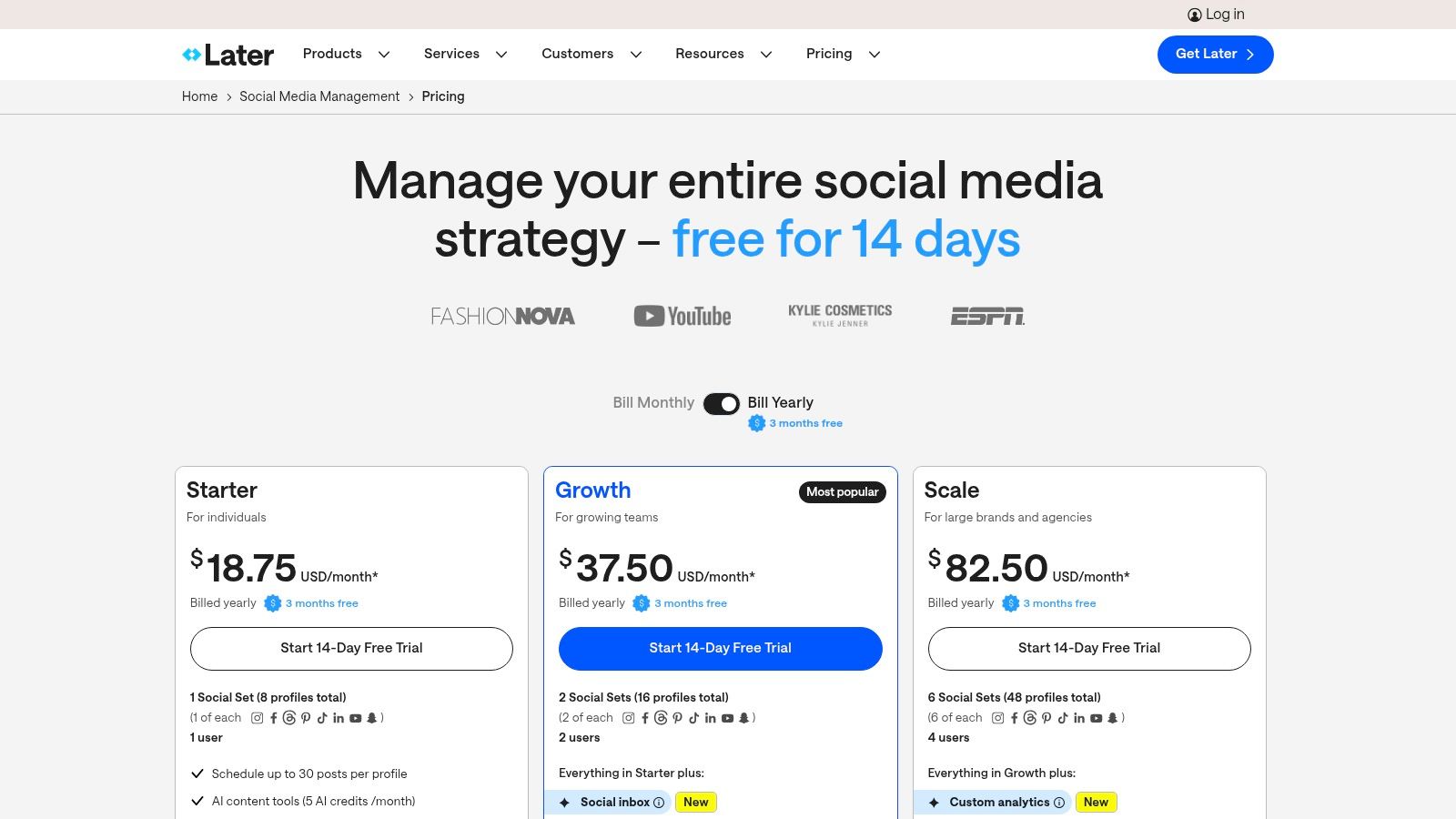
Key Features & Use Case
Later's Visual Planner is its signature feature, providing a clear preview of your Instagram grid before you post. This is invaluable for brands that depend on a curated, visually cohesive feed. The platform also supports product tagging for e-commerce businesses and offers a unified social inbox on its upper-tier plans for managing comments and messages. Its "Social Sets" concept bundles profiles and user seats, making it easy to scale as your team or client list grows.
- Best For: E-commerce brands, creators, and small agencies focused on visual platforms like Instagram and TikTok.
- Standout Feature: The drag-and-drop Visual Planner for crafting the perfect Instagram grid aesthetic.
- Pricing: A free plan is available with limitations. Paid plans start with the Starter tier at $25 per month for 1 Social Set (1 user, 6 profiles). The Growth plan is $45 per month, and the Advanced plan is $80 per month, offering unlimited posts.
Pros & Cons
| Pros | Cons |
|---|---|
| Excellent for visual planning and Instagram-centric workflows | Post caps on lower-tier plans can be restrictive |
| Intuitive user interface and easy onboarding with a free trial | Unlimited scheduling is only available on the Advanced plan |
| Powerful Linkin.bio tool included for driving traffic | Analytics and collaboration features are limited on cheaper plans |
Website: https://later.com/pricing
6. Loomly
Loomly positions itself as a "brand success platform," extending beyond simple scheduling to offer a collaborative environment for content creation, approval, and performance tracking. It is particularly well-suited for marketing teams and agencies that require structured workflows and client-friendly interfaces. By centralizing content planning, from initial ideas to final analytics, it streamlines the entire social media management process, making it one of the best social media scheduling tools for organizations prioritizing a clear content pipeline.
The platform provides a comprehensive content calendar that gives users a clear overview of all scheduled posts across multiple channels. It supports a wide range of platforms, including emerging ones like TikTok and Threads, ensuring brands can maintain a consistent presence everywhere. Loomly’s strength lies in its meticulous, step-by-step post-creation process, which includes checks for optimization, target audience, and approval status, minimizing errors and ensuring quality.
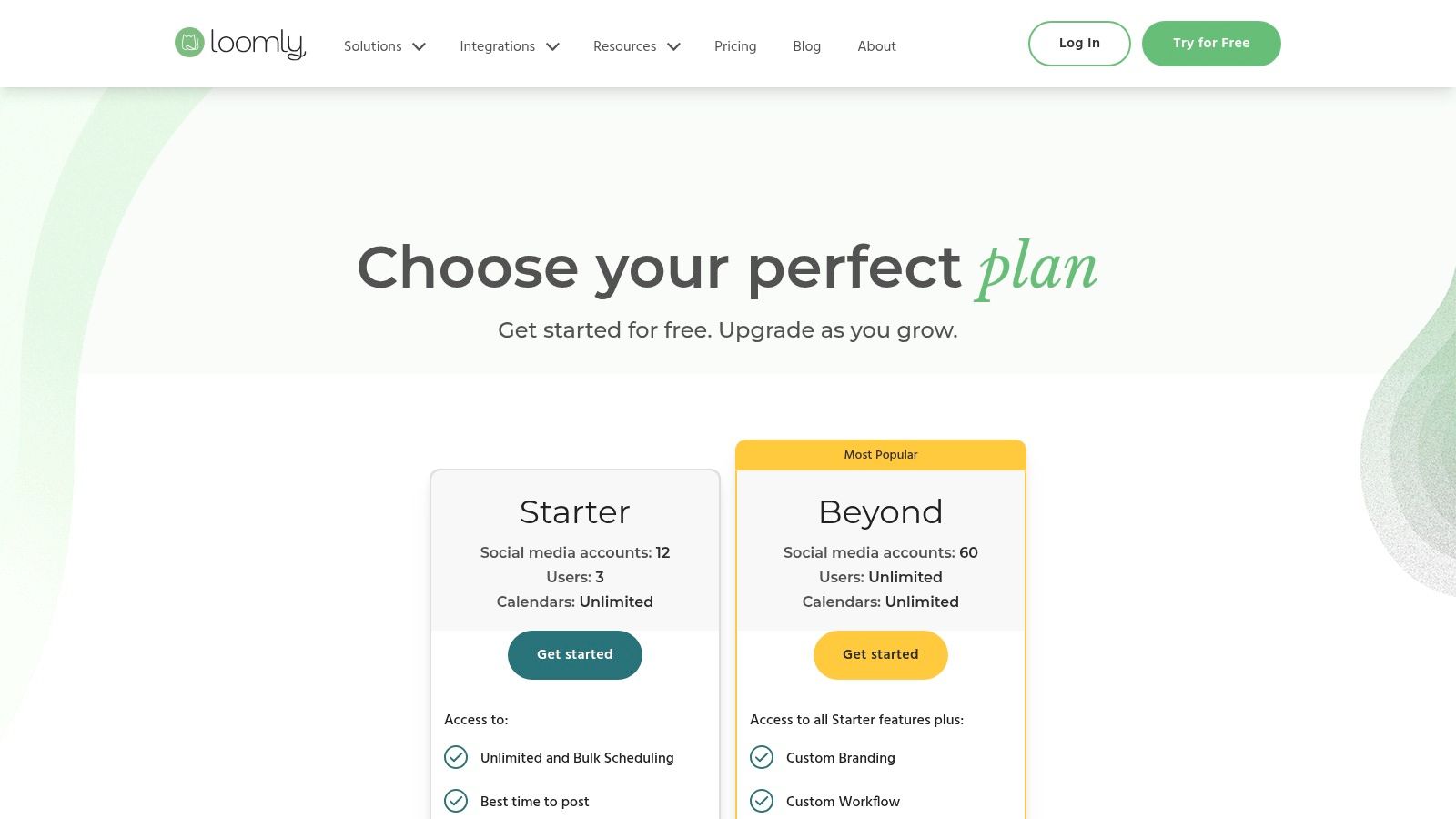
Key Features & Use Case
Loomly’s collaborative review and approval system is a standout, allowing team members and clients to comment on, edit, and approve mockups of posts before they go live. This feature is invaluable for agencies managing client accounts or for internal teams with multi-level approval needs. The platform also includes a centralized library for storing and organizing creative assets, making it easy to find and reuse approved photos, videos, and post templates.
- Best For: Marketing teams, agencies, and social media managers who need streamlined client and internal approval workflows.
- Standout Feature: Intuitive, multi-stage approval process and a clean, easy-to-navigate content calendar.
- Pricing: The Base plan starts at $42 per month for 2 users and 10 social accounts. The Standard plan is $84 per month, with custom pricing available for larger teams and enterprises. Annual billing offers a discount.
Pros & Cons
| Pros | Cons |
|---|---|
| Clean and client-friendly approval and sharing features | Exact plan details and pricing are revealed inside app checkout |
| Scalable from small teams to enterprises with custom quotes | Advanced social listening is not an emphasized feature |
| Wide range of integrations, including TikTok and Threads | The UI can feel less modern compared to some newer platforms |
Website: https://www.loomly.com/pricing
7. SocialPilot
SocialPilot has carved out a niche as one of the best social media scheduling tools for agencies and small-to-medium-sized businesses that need to manage a high volume of social profiles without an enterprise-level price tag. Its core strength lies in providing a robust, cost-effective solution that balances powerful features with affordability, making it an excellent choice for teams looking to scale their social media management efficiently.
The platform offers comprehensive scheduling, a unified social inbox, and detailed analytics, all within a clean and functional interface. Users can easily bulk schedule hundreds of posts via a CSV file, discover relevant content with its content curation feature, and use its AI Assistant to generate post copy and ideas. For agencies, the ability to create white-label reports and onboard clients seamlessly is a significant advantage.
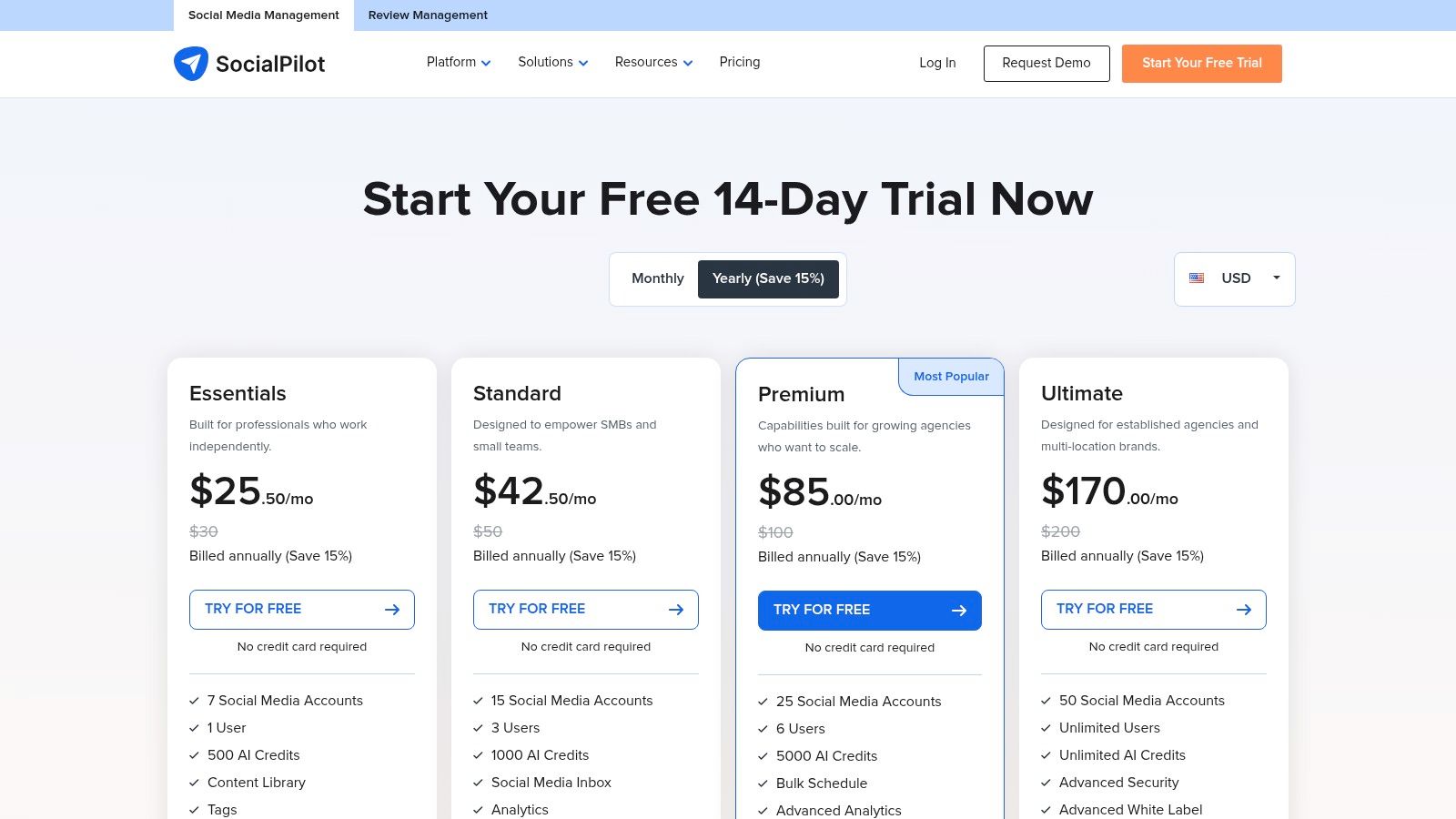
Key Features & Use Case
SocialPilot's value shines in its generous account and user limits across all plans, allowing teams to collaborate without hitting restrictive caps. The platform's team management features include setting specific roles and permissions, with approval workflows to ensure content quality before it goes live. This makes it an ideal fit for marketing agencies managing multiple client accounts or growing businesses that need a structured content approval process. Its features compare favorably with many other social media automation tools in its price range.
- Best For: Marketing agencies, SMBs, and teams needing to manage numerous social accounts affordably.
- Standout Feature: White-label reporting and client management tools tailored for agencies.
- Pricing: Plans start at $30 per month for the Professional tier (1 user, 10 social accounts). The Agency plan is $100 per month for 50 accounts and up to 5 users.
Pros & Cons
| Pros | Cons |
|---|---|
| Strong value with generous account limits per plan | User interface is functional but less polished than premium suites |
| Excellent for agencies with white-label and client management | Some advanced features are limited to higher-tier plans |
| Bulk scheduling and content curation features save time | Mobile app has fewer features than the desktop version |
Website: https://www.socialpilot.co/plans?utm_source=openai
8. CoSchedule Marketing Calendar
CoSchedule Marketing Calendar moves beyond simple social media scheduling to offer a unified, color-coded calendar for an entire marketing strategy. It’s designed for content teams and marketers who need to visualize and coordinate social media campaigns alongside blog posts, email newsletters, and other marketing projects. This holistic view makes it one of the best social media scheduling tools for teams seeking to break down content silos and ensure all efforts are aligned.
The platform's core is its drag-and-drop calendar, which simplifies rescheduling content and filling gaps in your content plan. CoSchedule’s "Best Time Scheduling" feature automatically publishes posts when your audience is most active, removing the guesswork. On paid plans, its AI assistant provides access to over 1,600 templates to help brainstorm ideas and craft social media copy, significantly speeding up the content creation process.
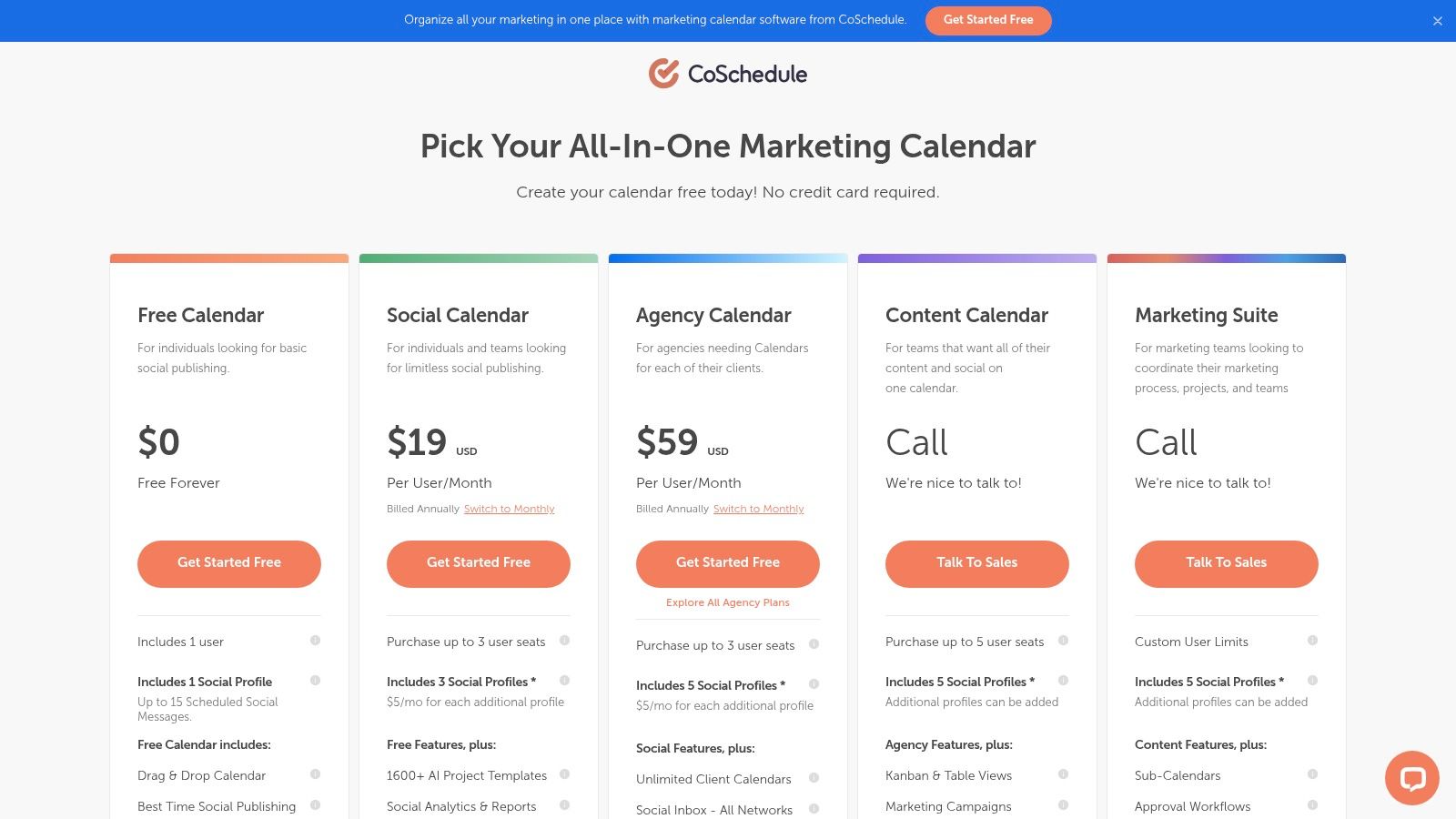
Key Features & Use Case
CoSchedule is built for strategic alignment. Marketing managers can oversee the entire content lifecycle, from blog post creation to the corresponding social promotion, all within a single dashboard. This integrated approach is ideal for content-heavy businesses that need to maintain a consistent publishing cadence. If you're looking to build a more organized workflow, you can learn more about how to create a marketing calendar for your blog. The platform also offers flexible add-ons, like social profile packs, allowing agencies and growing teams to scale their usage as needed.
- Best For: Content marketers, bloggers, and marketing teams needing to coordinate social media with their overall content calendar.
- Standout Feature: A unified marketing calendar that combines social scheduling with blog posts, emails, and project management.
- Pricing: A free plan is available for personal use. The Social Calendar plan starts at $19 per user per month, with custom pricing for Marketing Suite and more advanced tiers.
Pros & Cons
| Pros | Cons |
|---|---|
| Excellent for coordinating social posts with broader marketing plans | X/Twitter profiles are billed separately on some plans |
| Flexible per-user pricing suited for smaller teams | Advanced features require sales-led, higher-tier plans |
| Powerful AI content generation and idea templates | The interface can be overwhelming if only used for social scheduling |
Website: https://coschedule.com/pricing
9. Sendible
Sendible is purpose-built for marketing agencies and teams managing multiple client accounts, positioning itself as one of the best social media scheduling tools for streamlined client management. Its core strength lies in its white-label capabilities and collaborative features, which allow agencies to provide clients with branded reports and a seamless approval process. The platform is designed to handle volume, offering customized dashboards for each client to keep content, analytics, and communications neatly organized.
The tool supports a broad range of social networks, including direct scheduling for TikTok and Google Business Profile posts. Sendible’s content creation suite includes a Canva integration, a smart post creator to tailor messages for each network, and content libraries to store and reuse evergreen assets. This focus on agency-specific workflows makes it a powerful and efficient choice for managing a diverse client portfolio.
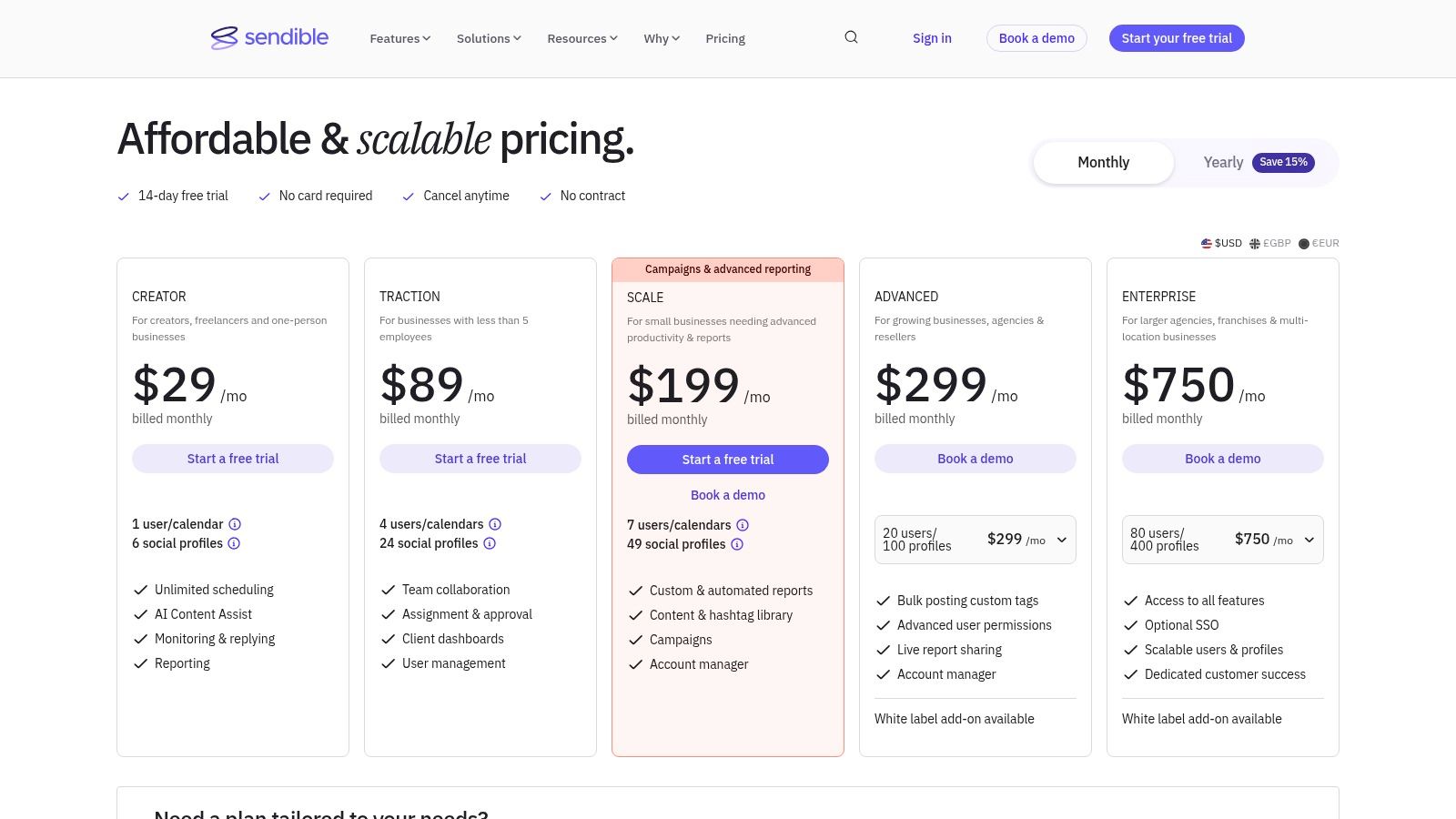
Key Features & Use Case
Sendible’s Priority Inbox is a key feature, consolidating all incoming messages and mentions into a single stream where teams can assign tasks and monitor response times. The platform's reporting is highly customizable, allowing users to build detailed, visually appealing reports from scratch or use pre-built templates. For agencies, the ability to automatically generate and send these reports to clients on a schedule saves a significant amount of administrative time.
- Best For: Marketing agencies, freelancers, and social media managers handling multiple client brands.
- Standout Feature: White-label dashboards and reporting that can be branded for agency clients.
- Pricing: Plans start at $29 per month for the Creator plan (1 user, 6 profiles). The Traction plan for small teams is $89 per month, with custom pricing for larger agency and white-label needs.
Pros & Cons
| Pros | Cons |
|---|---|
| Excellent features for agency-client collaboration and approvals | Daily publishing limits are imposed per user to align with platform APIs |
| Broad network support including Google Business Profile and TikTok | White-labeling features are typically an add-on or in higher-tier plans |
| Customizable and automated client reporting capabilities | The interface can have a learning curve for beginners |
Website: https://www.sendible.com/pricing
10. Publer
Publer stands out in the crowded market of social media scheduling tools with its highly flexible and cost-conscious approach. It is designed for freelancers, small businesses, and agencies that need a customizable solution without being locked into expensive, rigid tiers. The platform's standout feature is its "pay-for-what-you-need" model, allowing users to build a plan by selecting the exact number of social accounts and team members they require.
Its generous forever-free plan is a major draw for individuals or startups just beginning their social media journey, offering a practical way to manage up to three accounts. Publer also integrates directly with design tools like Canva and VistaCreate, streamlining the content creation and scheduling workflow. This focus on flexibility and affordability makes it a strong contender for those who prioritize budget control and custom-fit solutions.
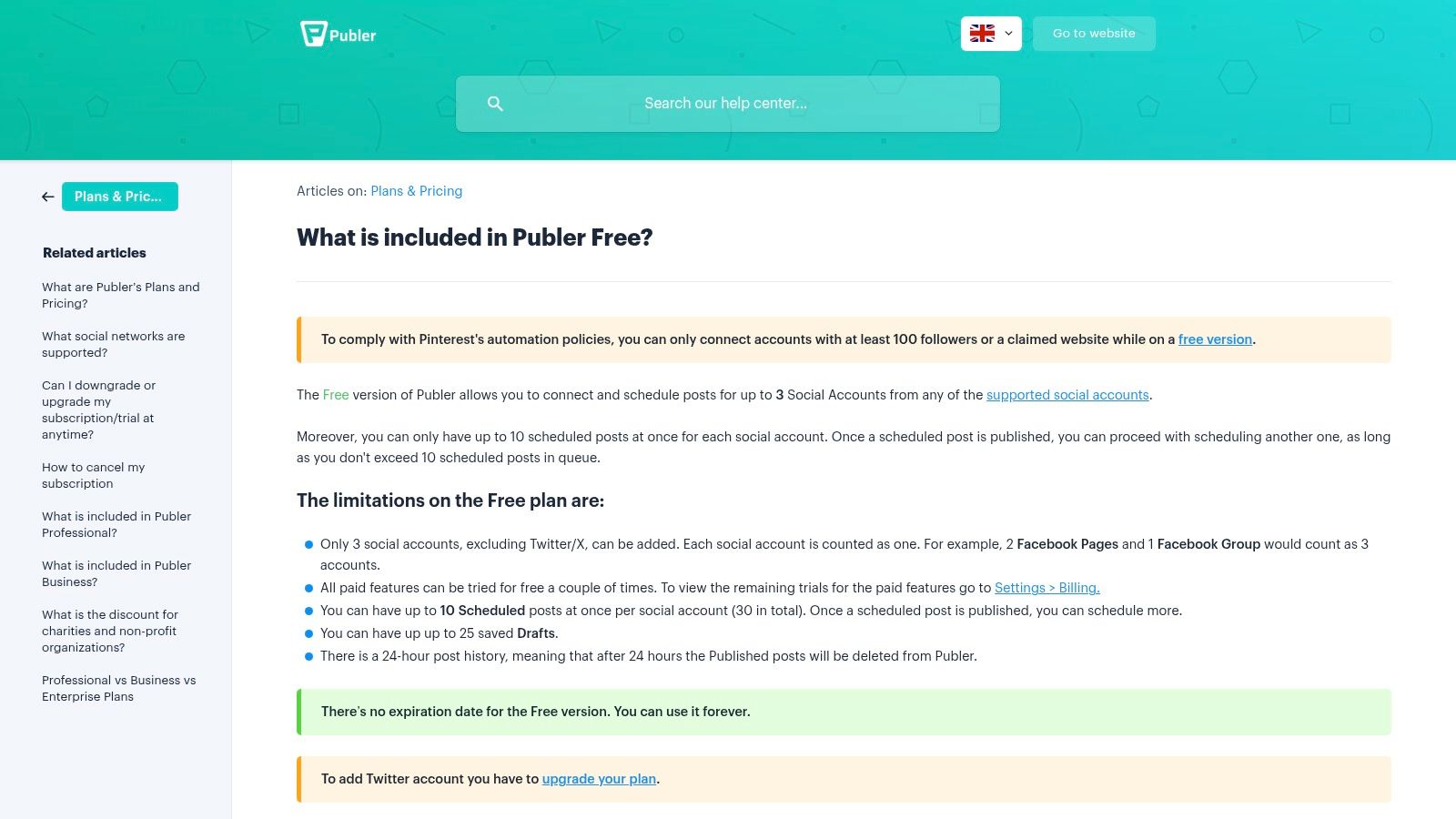
Key Features & Use Case
Publer’s core strength lies in its customizable subscription model, which gives users granular control over their spending. A unique and user-friendly feature is the ability to pause a subscription at any time, preserving all data and settings until it's reactivated. This is ideal for freelancers or agencies with fluctuating client loads. The platform also includes a link-in-bio tool, allowing users to create a custom landing page for their social profiles directly within the app.
- Best For: Freelancers, small businesses, and agencies looking for a highly flexible, budget-friendly scheduling tool.
- Standout Feature: A "build-your-own-plan" pricing model and the ability to pause subscriptions without losing data.
- Pricing: A forever-free plan is available for 3 social accounts. Paid plans are fully customizable, with pricing configured during checkout based on the number of accounts and users selected.
Pros & Cons
| Pros | Cons |
|---|---|
| Highly customizable, pay-for-what-you-need pricing | Pricing details are configured in checkout rather than in fixed tiers |
| Generous free plan is practical for simple scheduling | Advanced analytics and listening are limited compared to premium suites |
| Ability to pause subscriptions without losing data | User interface is functional but less polished than some competitors |
Website: https://help.publer.io/en/article/what-is-included-in-publer-free-dliovh//?utm_source=openai
11. PLANOLY
PLANOLY has carved out a niche as the go-to visual planner for Instagram, TikTok, and Pinterest, making it an indispensable tool for creators, influencers, and e-commerce brands. Its strength lies in its intuitive drag-and-drop interface that allows users to meticulously plan their grid aesthetic before posting. This visual-first approach sets it apart from more data-heavy platforms, solidifying its place among the best social media scheduling tools for content creators focused on brand imagery.
The platform simplifies content creation with an integrated AI Caption Writer to overcome writer's block and ensures posts are discoverable with features like hashtag grouping. PLANOLY also supports direct auto-posting for various content types, including Instagram Reels and TikTok videos, which is a major workflow enhancement. For those monetizing their audience, the Sellit and Linkit add-ons provide lightweight e-commerce and bio-link solutions directly within the platform.
Key Features & Use Case
PLANOLY’s core function is its visual grid planner, which allows users to see exactly how their upcoming posts will look together on their Instagram profile. This is crucial for maintaining a cohesive and professional brand aesthetic. The platform also offers a multi-channel workspace to plan and schedule content across Pinterest and TikTok, using a centralized content calendar.
- Best For: Instagram-centric creators, influencers, and small e-commerce businesses that prioritize visual brand identity.
- Standout Feature: Intuitive drag-and-drop visual grid planner for perfecting Instagram aesthetics.
- Pricing: A free plan is available for 1 social set. Paid plans start with the Starter tier at $13 per month, Premier at $23 per month, and Business at $36.50 per month, all billed annually. A 7-day free trial is offered on paid plans.
Pros & Cons
| Pros | Cons |
|---|---|
| Excellent, easy-to-use visual planning for Instagram and TikTok | Primarily creator-centric with fewer enterprise workflows |
| Affordable entry-level pricing with a functional free plan | Analytics are less extensive than premium competitors |
| Integrated e-commerce and link-in-bio tools | Limited team collaboration features on lower-tier plans |
Website: https://www.planoly.com/pricing
12. Meta Business Suite (Facebook & Instagram)
For individuals and businesses whose primary audience lives on Facebook and Instagram, Meta Business Suite is an essential and entirely free native tool. It streamlines content management by integrating scheduling, a unified inbox, and performance insights directly within the Meta ecosystem, making it a powerful choice for those focusing exclusively on these platforms.
The suite simplifies workflow by allowing users to schedule both posts and Stories from a single, intuitive calendar view. It also provides AI-powered suggestions for optimal posting times based on when your audience is most active. Its direct integration means you can manage Facebook Pages, Instagram profiles, and Messenger communications without ever leaving the platform, ensuring reliability and access to the latest features.

Key Features & Use Case
Meta Business Suite’s core strength is its unified inbox, which consolidates comments and messages from Facebook, Instagram, and Messenger into one feed. This centralization allows for efficient community management and faster response times. The platform also offers basic but useful analytics, tracking content reach, engagement, and audience demographics, which is perfect for small businesses needing straightforward performance data.
- Best For: Small businesses, solopreneurs, and content creators focusing primarily on Facebook and Instagram.
- Standout Feature: A completely free, native scheduler and unified inbox for Meta's core platforms.
- Pricing: Free to use for anyone with a Facebook Page and Instagram business profile.
Pros & Cons
| Pros | Cons |
|---|---|
| Completely free and officially supported by Meta | No support for scheduling to non-Meta platforms (e.g., X, LinkedIn) |
| Direct integration ensures reliability and access to new features | Analytics are less advanced than dedicated third-party tools |
| Unified inbox for Facebook, Instagram, and Messenger | Features and interface are subject to frequent changes by Meta |
Top 12 Social Media Scheduling Tools Comparison
| Platform | Core Features/Automation | User Experience & Quality ★★★★☆ | Value & Pricing 💰 | Target Audience 👥 | Unique Selling Points ✨ |
|---|---|---|---|---|---|
| EvergreenFeed 🏆 | Automates Buffer scheduling; randomized buckets | ★★★★☆ Saves 7+ hrs/week; intuitive dashboard | Free signup, upgrade as needed 💰 | Individuals, SMBs, marketing teams 👥 | Random post selection; easy Buffer integration ✨ |
| Hootsuite | Unlimited scheduling; social inbox; analytics | ★★★★★ Enterprise-ready with team workflows | Premium pricing; add-ons for listening 💰 | Enterprises, advanced users 👥 | AI-powered assistance; competitive benchmarking ✨ |
| Sprout Social | Calendar scheduling; social CRM; reporting | ★★★★★ Market-leading reporting & team features | Per-seat pricing, add-ons extra 💰 | Teams, brands, agencies 👥 | AI Assist; influencer marketing tools ✨ |
| Buffer | Multi-platform scheduling; engagement inbox | ★★★★☆ Simple UI; good free tier | Flexible per-channel pricing 💰 | Creators, SMBs 👥 | Supports Threads, TikTok; hashtag manager ✨ |
| Later | Visual planner; Instagram product tagging | ★★★★☆ Great Instagram focus; easy onboarding | Post caps on lower plans; free trial 💰 | Creators, brands, small agencies 👥 | Visual planner; link-in-bio tool ✨ |
| Loomly | Scheduling; approvals; content calendar | ★★★★☆ Client-friendly; scalable | Pricing details inside app 💰 | Teams, agencies, clients 👥 | Client approvals; broad network integrations ✨ |
| SocialPilot | Bulk scheduling; analytics; white-label reporting | ★★★☆☆ Functional UI; strong value per account | Cost-effective; scales well for agencies 💰 | SMBs, agencies 👥 | White-label; bulk & AI scheduling credits ✨ |
| CoSchedule Marketing Calendar | Drag-drop calendar; AI templates; team packs | ★★★★☆ Integrates social with marketing plans | Flexible per-user pricing 💰 | Small teams, marketers 👥 | AI-powered marketing calendar ✨ |
| Sendible | Multi-calendar; priority inbox; white-label | ★★★★☆ Agency workflows; reporting options | Add-ons for white-label 💰 | Agencies, client teams 👥 | Broad network coverage; client collaboration ✨ |
| Publer | Flexible accounts; Canva integration; free plan | ★★★☆☆ Custom pricing; free tier practical | Pay-per-need; pause subscriptions 💰 | Small teams, simple schedulers 👥 | Custom pricing; pause subscriptions ✨ |
| PLANOLY | Visual planner; auto-post; AI captions | ★★★★☆ Intuitive visual IG/TikTok planning | Competitive entry pricing 💰 | Creators, shops 👥 | IG grid planning; commerce tools ✨ |
| Meta Business Suite | Native FB & IG scheduling; unified inbox | ★★★☆☆ Free official tool; basic analytics | Free 💰 | Meta platform users 👥 | Direct Meta integration; ad & page management ✨ |
The Final Word on Scheduling Your Success
Navigating the crowded market of the best social media scheduling tools can feel overwhelming, but making an informed choice is a pivotal step toward transforming your social media management from a reactive chore into a proactive, strategic powerhouse. Throughout this guide, we've dissected twelve distinct platforms, each designed to solve different problems for different users. The key takeaway is simple: there is no single "best" tool for everyone. Your perfect platform is the one that seamlessly integrates with your specific workflow, aligns with your budget, and directly supports your marketing objectives.
The journey from manual posting to automated efficiency is not just about saving time; it's about reclaiming strategic headspace. By offloading the repetitive task of publishing content, you free yourself up to focus on what truly matters: engaging with your audience, analyzing performance data, and refining your content strategy.
Recapping Your Top Choices
To simplify your decision, let's recap the core strengths of the platforms we've explored:
- For the All-in-One Enterprise: Sprout Social and Hootsuite remain top contenders, offering robust, end-to-end solutions that combine scheduling with deep analytics, team collaboration, and social listening. They are ideal for large teams and agencies that require comprehensive oversight and reporting.
- For the Visual-First Creator: If your brand lives on Instagram, TikTok, or Pinterest, tools like Later and PLANOLY are built for you. Their drag-and-drop visual planners and dedicated features for visual platforms make crafting a beautiful and cohesive feed incredibly intuitive.
- For the Budget-Conscious SMB: SocialPilot and Publer deliver exceptional value, packing powerful features like bulk scheduling, client management, and broad platform support into affordable packages. They prove you don't need an enterprise budget to achieve professional-grade results.
- For the Content-Driven Marketer: CoSchedule Marketing Calendar stands out for its holistic approach, integrating your social schedule with your entire content marketing ecosystem. It’s the ultimate command center for marketers juggling blogs, emails, and social campaigns.
- For the Automation Specialist: EvergreenFeed carves a unique niche by focusing exclusively on automating the recycling of your best-performing content. This is a game-changer for maintaining a consistent presence and maximizing the lifespan of your valuable assets without manual effort.
How to Make Your Final Decision
Feeling stuck? Your next steps should be hands-on and practical. Before you commit to a subscription, leverage the free trials offered by most of these platforms. Use this trial period to test the tool against your real-world needs.
Ask yourself these critical questions during your evaluation:
- Is the user interface intuitive for me? Can I find what I need quickly, or am I constantly hunting through menus? A clunky interface will only add friction to your workflow.
- Does it genuinely save me time? Run a test for a week. Does the tool's content creation, scheduling, and approval process feel more efficient than your current method?
- Are the analytics actionable? Look beyond vanity metrics. Does the reporting help you understand what content resonates with your audience and how you can improve?
- Does it support my most important platforms? Ensure the tool has full, native support for the social media channels where your audience is most active, including specific features like Instagram Stories or TikTok scheduling.
- Can it scale with my business? Consider your future needs. Will this tool support additional team members, more social profiles, or more advanced features as your brand grows?
Ultimately, the best social media scheduling tool is an investment in consistency and strategy. It acts as a reliable partner, ensuring your message reaches your audience at the right time, every time. This consistency builds trust, fosters community, and drives measurable growth, allowing you to move from simply "doing" social media to executing a powerful, data-driven strategy with confidence.
Ready to put your best content on autopilot and maximize its impact? For those looking to solve the specific challenge of keeping their feeds consistently active with proven content, EvergreenFeed offers a powerful, specialized solution. Learn how you can build a library of your top-performing posts and let automation handle the rest at EvergreenFeed.




